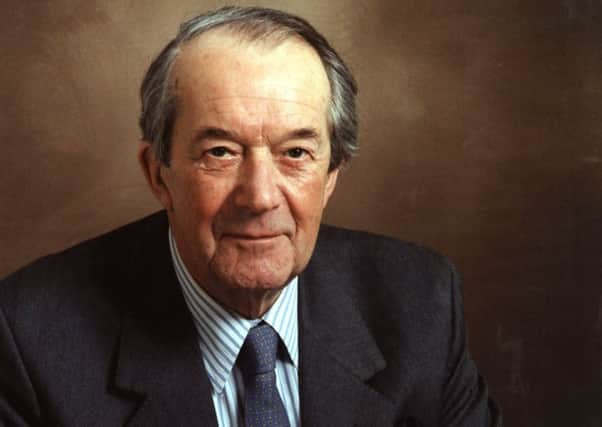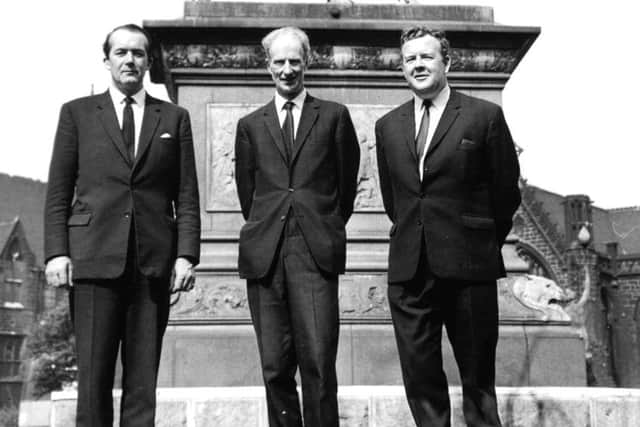Ward Thomas, founding executive of Yorkshire Television


A grandee within the broadcast industry, he nevertheless maintained discreet public profile, seldom courting publicity, even in the business pages.
He could be prickly, especially with politicians who meddled in broadcasting. But he was unquestionably a maverick, the extent of whose exploits was unknown to many who passed through the Leeds studios.
Advertisement
Hide AdAdvertisement
Hide AdHe had come to Yorkshire from the Scottish Highlands, where he had been running the small ITV contractor, Grampian Television. The Independent Television Authority had invited applications for its newly-created Yorkshire franchise, and Ward Thomas had put together a consortium with a Blackpool TV rental company called Telefusion and a stellar array of talent behind and in front of the camera – the BBC executive Donald Baverstock and presenter Alan Whicker among them.


With the contract theirs, construction began on the first building in Europe purpose-built for colour TV, and Yorkshire Television went on air at the end of July, 1968.
It was to be a baptism of fire. Within a year, the Yorkshire weather had brought down the transmission mast on Emley Moor. The storm was weathered, but dark financial clouds on the horizon brought about a partial merger with Tyne-Tees Television, and Thomas became managing director of their holding company, Trident Television. Its other interests included Windsor Safari Park.
The regulator ended the arrangement at the next franchise round, and Trident, with Thomas now chairman, bought Hugh Hefner’s Playboy Club and his strong of casinos.
Advertisement
Hide AdAdvertisement
Hide AdHe retired from the business in 1984 and located to France, but his TV career was to have a surprising second act when in 1993 he was persuaded to return as chairman of the now fully-merged Yorkshire Tyne-Tees TV following an expensive franchise bid that had led the company to sell £15m more advertising airtime than it was able to deliver. His first duty was to demand the resignation of the managing director, Clive Leach.
Thomas considered himself the father of the company, he told staff, and was not about to see it go under.
But he was hardly unused to adversity.
Born in Wimbledon and educated at an independent Church school in Banbury, he was studying at Rouen in northern France when the Germans invaded in the Spring of 1940.
Ignoring advice from the British Consul to get out at once, by way of Bordeaux, he headed instead for Paris, battling against the flow of refugees heading south and eventually squeezing on to a ferry from St Malo.
Advertisement
Hide AdAdvertisement
Hide AdBack in England, he had to complete his schooling, but a week after the end of term, he had become Aircraftsman 2nd Class 1484893, training in Devon, Scotland, South Africa and America.
By 1944, he was flying Lancasters with 550 Squadron at North Killingholme on the Humber, embarking on more than 30 missions over key targets on the Rhur and Berlin. Several times he was hit and had to limp home in damaged aircraft, but, as he was the first to admit, he was one of the lucky ones. Some 33 crews from the Squadron did not return.
No-one died or got killed, he reflected – they just “bought it”, as if death was an optional extra.
Upon demob and having earned the Croix de Guerre and the Distinguished Flying Cross, he learned that Swissair was looking for qualified air crew, and within weeks had moved to Zurich as captain of a weekly 22-hour flight to New York.
Advertisement
Hide AdAdvertisement
Hide AdAt the same time, he was indulging his passion for fast cars, winning the Belgian Prix de la Province de Namur and the Brands Hatch championship in Kent and becoming accepted into the British Racing Drivers’ Club.
It was during one of his New York stopovers that he began to take an interest in the emerging world of commercial television. He left his job, paid for a management and business course, and set off for the two-man sales department in Sidney Bernstein’s new venture in Manchester, Granada TV.
The power of the new medium was evident when he negotiated a deal with Renault for a £10 fee for every car they sold over their target. There was quickly a six-month waiting list for one.
But as the 1950s came to an end, and with a wife and daughter to support, he raised his sights and joined a consortium applying for the franchise that would become Grampian Television in Aberdeen. He joined as sales director but became chief executive shortly after it went on air. His combative style was soon in evidence – in a skirmish that was to be the harbinger of many to come in Yorkshire, he threatened to close the station down in the face of demands for changes from the unions.
Advertisement
Hide AdAdvertisement
Hide AdHis final act in television, in 1997, saw him partially realising his hope of consolidating the ITV companies into a single entity as he oversaw the sale of YTV to his old employer, Granada.
He married twice, first to Patricia Cornelius and then to Janice Topp, and had a son and daughter.